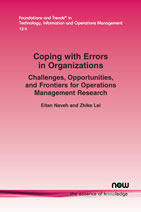Coping with Errors in Organizations: Challenges, Opportunities, and Frontiers for Operations Management Research
By Eitan Naveh, Technion–Israel Institute of Technology, Israel, naveh@ie.technion.ac.il | Zhike Lei, Pepperdine University, USA, zhike.lei@pepperdine.edu
Abstract
Errors prevail in various aspect of our lives such as physical safety, organizational success, financial outcomes, and even the political arena. For this reason, errors merit study in their own right as an important phenomenon of growing theoretical and managerial significance. Although much has been written in the past few decades about product life cycles, efficiency, quality control, and learning in organizations, error research has yet to be at the center stage of organizational science and practice, and our understanding of error-coping strategies remains limited. Our aim in this monograph is to present and integrate various cutting-edge theoretical frameworks and methodologies from the operations management and organizational research literatures. By promoting a dialogue between two primary business disciplines, we hope to illuminate some promising paths for the integration of specific approaches and diverse disciplinary backgrounds. Through the development of learning exchanges within OM and between OM and organizational research methodologies, we strive to help managerial practitioners and policy makers to build a body of knowledge on errors that is more visible, inspectable, systematic, and influential on their daily practice. The ultimate goals are centered on reducing adverse error consequences while, also importantly, capitalizing on opportunities for positive outcomes such as innovation and learning.
Coping with Errors in Organizations: Challenges, Opportunities, and Frontiers for Operations Management Research
Coping with Errors in Organizations presents and integrates various cutting-edge theoretical frameworks and methodologies from the operations management and organizational research literatures to use diverse methodologies in order to help organizations to excel in reliability, performance, and innovation. Through the development of learning dialogues within OM and between OM and organizational research methodologies, the authors strive to help managerial practitioners and policy makers to build a body of knowledge on errors that is more visible, inspectable, systematic, and influential on their daily practice. The ultimate goals are centered on reducing adverse error consequences while capitalizing on opportunities for positive error-related outcomes such as innovation, continuous improvement, and learning.
The monograph first introduces the key definition of errors in organizations and its relationship with other concepts. Second, it provides a well-structured review of errors in the OM literature. Third, by contrasting different research methodologies present in the fields of OM and organizational research, the authors suggest using the priority level of analysis, and temporal lenses for a more integrative, holistic approach to errors in organizations. Finally, the monograph identifies and suggests research and practical implications of the challenges and opportunities involved in reducing errors’ negative consequences while increasing the learning and innovation possibilities they provide.
